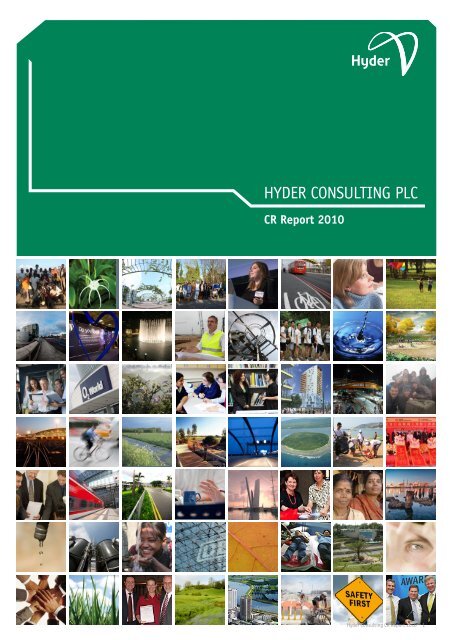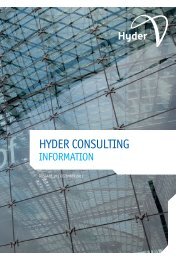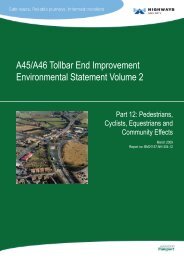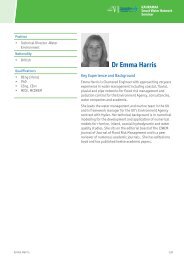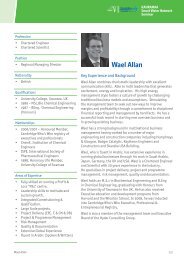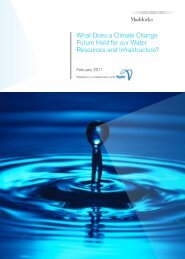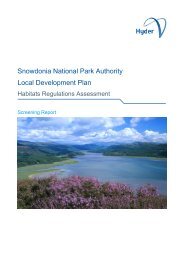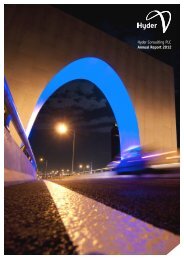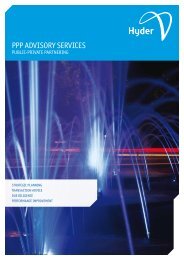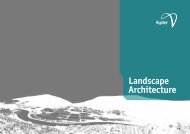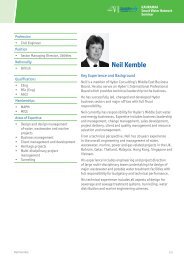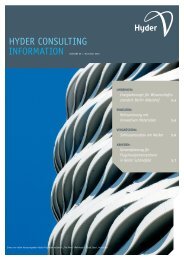Hyder Consulting plc Corporate Responsibility Report 2010
Hyder Consulting plc Corporate Responsibility Report 2010
Hyder Consulting plc Corporate Responsibility Report 2010
You also want an ePaper? Increase the reach of your titles
YUMPU automatically turns print PDFs into web optimized ePapers that Google loves.
HYDER CONSULTING PLC<br />
CR <strong>Report</strong> <strong>2010</strong><br />
<strong>Hyder</strong> <strong>Consulting</strong> CR <strong>Report</strong> <strong>2010</strong> 1
Front cover: Pak Shek Kok, Hong Kong.<br />
Contents<br />
Introduction from Ivor Catto 1<br />
Our approach to CR 1<br />
Our corporate responsibility policy 3<br />
Our performance against our 2009 targets 4<br />
Fundraising and charity work targets exceeded 5<br />
Our performance against our CR policy 5<br />
Guiding our clients on sustainability and<br />
preserving the environment 7<br />
Our commitment to our employees 9<br />
Our suppliers: enhancing green procurement 11<br />
in the UK<br />
Our investors<br />
11<br />
Helping communities around us 12<br />
Improving our environmental performance 13<br />
Sharing our expertise 15<br />
Next years objectives 16<br />
Outlook - developing the future, responsibly 16<br />
<strong>Hyder</strong> <strong>Consulting</strong> PLC Annual <strong>Report</strong> <strong>2010</strong>
Directors’ report corporate responsibility<br />
Introduction<br />
from Ivor Catto<br />
We set the following tangible and challenging CR objectives for<br />
the financial year 2009-10;<br />
• To actively participate in a minimum of five selected<br />
charities, contributing total funding of £25,000 as a<br />
minimum and expertise to assist their work.<br />
• To provide 4,000 hours of employee time to local charity<br />
work.<br />
• To establish and implement an effective and consistent<br />
monitoring and targeting process for capturing data from<br />
each region on our waste, energy and water consumption.<br />
• To establish a system for capturing employee air travel data<br />
so that we can set reduction targets in <strong>2010</strong>.<br />
• To include an assessment of how we compare to similar<br />
companies based on a review of their CR reports and/or<br />
informal benchmarking in our <strong>2010</strong> CR <strong>Report</strong>.<br />
<strong>Corporate</strong> responsibility<br />
(CR) is a guiding principle<br />
underpinning our values and<br />
is integral to our company<br />
strategy. For <strong>Hyder</strong>, this means<br />
striving to ensure that our<br />
activities have positive effects<br />
on our clients, suppliers,<br />
employees, shareholders and<br />
the wider community as well as<br />
the environment.<br />
I am pleased with our success in achieving these targets,<br />
particularly in exceeding our goal of giving 4,000 hours of<br />
working time to charitable organisations. I am proud that in a<br />
year of global economic uncertainty we have been able to make<br />
a real difference to society through our people’s commitment,<br />
skills and expertise.<br />
However, as we strongly believe in continuous improvement,<br />
our focus in 2011 will be to further enhance our performance by<br />
implementing a more consistent approach for capturing CR data,<br />
reducing our carbon footprint by 5%, as well as maintaining our<br />
support to five charities.<br />
Through these measures, we will build on our history of using<br />
our technical expertise to enrich communities around the world<br />
and create positive legacies for future generations.<br />
Our approach to CR<br />
CR is fundamental to our business. By taking responsibility<br />
for the effect our work has on our clients, people, suppliers<br />
and partners, investors and communities as well as the<br />
environment, we seek to improve the quality of life for society<br />
at large.<br />
<strong>Hyder</strong> <strong>Consulting</strong> CR <strong>Report</strong> <strong>2010</strong> 1
2 <strong>Hyder</strong> <strong>Consulting</strong> CR <strong>Report</strong> <strong>2010</strong> Pak Shek Kok, Hong Kong.
Our <strong>Corporate</strong> <strong>Responsibility</strong> Policy<br />
Our policy on corporate responsibility is set out below.<br />
<strong>Hyder</strong> <strong>Consulting</strong>’s vision is to be the trusted<br />
partner of valued clients creating exceptional<br />
solutions. We are committed to operating our<br />
business in an ethical and responsible manner<br />
and apply the principles of sustainability to<br />
all our business operations.<br />
Our clients<br />
From our advisory and design work through to the management<br />
of major projects, we create innovative solutions that achieve<br />
environmental, social and economic benefits for society.<br />
Our people<br />
We aim to be an employer of choice by embracing diversity and<br />
fostering an open and inclusive learning culture. We encourage<br />
our people to take an active responsibility for their own<br />
development and provide a range of tools including eLearning<br />
and coaching/mentoring programmes to support this. The group<br />
Health and Safety Policy outlines our commitment to health<br />
and safety and demonstrates that our people’s wellbeing is of<br />
paramount importance.<br />
Our suppliers and partners<br />
We partner with our suppliers, promoting fairness and ethical<br />
behaviour, and, where appropriate, support them in developing<br />
their own corporate responsibility.<br />
Our investors<br />
<strong>Hyder</strong> offers an opportunity for responsible investment, founded<br />
on our ethical approach to doing business for over 150 years.<br />
Local communities<br />
We support our people’s enthusiasm for helping both local and<br />
more disadvantaged developing world communities. We strongly<br />
encourage our people to contribute their expertise towards<br />
charitable work, educational and community programmes.<br />
Professional communities<br />
We are keen to promote employee involvement and participation<br />
in professional institutions and bodies. We play an active<br />
role in developing best practice and facilitating professional<br />
collaboration in all our technical fields.<br />
The environment<br />
We work to minimise the environmental effects of our own<br />
operations and those of the projects in which we are involved.<br />
We continuously drive for more efficient use of resources such as<br />
energy, to help reduce greenhouse gas emissions and mitigate<br />
climate change.<br />
The board of <strong>Hyder</strong> <strong>Consulting</strong> PLC is responsible for endorsing this<br />
policy. Our executive board oversees its effective implementation<br />
and communication ensuring actions are taken forward, adequate<br />
resources are available for implementation and that progress is<br />
reviewed.<br />
We are committed to reporting annually on our progress against<br />
the parameters of our CR policy and goals set in the previous<br />
financial year in a format which is easily accessible to all our<br />
stakeholders. We also seek to benchmark our performance against<br />
our peers and against recognised best practice.<br />
<strong>Hyder</strong> <strong>Consulting</strong> CR <strong>Report</strong> <strong>2010</strong> 3
Our performance against our<br />
2009 targets<br />
Partnering with our charities<br />
Over the past year we have partnered with selected charities<br />
to understand their objectives and how we could best support<br />
them through our people’s skill and expertise. This approach has<br />
enabled us to provide not only donations in excess of £25,000<br />
but also the following practical support:<br />
• Engineers Against Poverty: our engineers provided<br />
technical input on guidance notes that will be issued to<br />
organisations planning and building roads in developing<br />
countries.<br />
• WaterAid: offices in Australia and the UK held fundraising<br />
activities in 2009 and events in support of World Water<br />
Day in March <strong>2010</strong>. <strong>Hyder</strong>’s UK offices have collected<br />
mobile phones to donate to WaterAid’s phone recycling<br />
scheme and our Bristol office participated in the charity’s<br />
“Coasting Along” sponsored cycle ride.<br />
• Engineers for Overseas Development (EFOD): <strong>Hyder</strong> has<br />
supported EFOD’s work at the Casso Orphanage in Soroti<br />
and the Koutulai Mill, both in Uganda. These projects have<br />
created safe accommodation for orphans and a facility for<br />
a local community of widows to grind their crops at no cost<br />
and generate income by grinding neighbours’ crops at a<br />
commercial rate.<br />
• Ingenieure ohne Grenzen (Engineers Without Borders,<br />
Germany): representatives from <strong>Hyder</strong> Germany are<br />
developing a close relationship with the charity to identify<br />
where we can provide technical engineering assistance on<br />
current and future projects in Africa, Nepal, Central and<br />
South America.<br />
• Red Cross/Red Crescent: we established a memorandum<br />
of understanding with Red Cross in Manila, and have<br />
supported the charity through the “Give a Blood, Give a<br />
Life” campaign in which 31 members of our Manila office<br />
gave blood. In the Middle East, our people raised funds<br />
for the Red Cross Society of Sri Lanka to finance 139 water<br />
purifying filters for the internal displaced people (IDPs)<br />
from the recent war.<br />
• Dubai Cares: our Middle East business supported the<br />
charity’s “Thirst for Education” campaign raising over<br />
£1,630 which will help provide clean drinking water to 326<br />
children.<br />
Collaboration between a planner and<br />
engineer benefits Ugandan orphans<br />
As part of an EFOD programme, Raoul Tufnell<br />
(planner) and Krzysztof Jaklinski (engineer)<br />
spent two weeks in Uganda in January <strong>2010</strong><br />
overseeing the construction of facilities for<br />
the Casso Orphanage.<br />
The project programme was tight and in<br />
order to meet the deadlines, Raoul and<br />
Krzysztof combined their understanding of<br />
technical design solutions with a pragmatic<br />
approach to project delivery. Raoul<br />
comments: “In such a short working period it<br />
was critical to engage our 28-strong workforce<br />
as quickly as possible. There had to be a twoway<br />
communication culture and, for resourcing<br />
the required building supplies, there was a<br />
need to establish strong and honest working<br />
relationships with Soroti’s building merchants.”<br />
They found the assignment to be personally very rewarding: <strong>Hyder</strong> has supported a grass-roots project that will deliver a<br />
much needed facility for victims of a civil conflict in the developing world, whilst encouraging staff development in the<br />
practical implementation of design drawings and project management.<br />
4 <strong>Hyder</strong> <strong>Consulting</strong> CR <strong>Report</strong> <strong>2010</strong>
Fundraising and charity work<br />
targets exceeded<br />
As well as setting a target of 4,000 hours of employee time<br />
to be donated to charitable work, we also pledged that as an<br />
organisation we would raise £30,000 for charity through our<br />
people’s efforts. Our people have exceeded these targets by<br />
raising £41,251 for charity (in addition to the £25,000 which<br />
<strong>Hyder</strong> donated to the five charities we support as a group). We<br />
also donated 4,586 hours of voluntary work.<br />
Our people played a very proactive role organising a wide<br />
range of activities including collections for victims of the<br />
Haiti earthquake; sponsored knits, runs and walks; helping<br />
school children improve their literacy skills; selling Fairtrade<br />
confectionery and donating food to disadvantaged people in<br />
Manila. Our initiatives have helped over 30 charities across our<br />
five regions.<br />
Systems for capturing data implemented<br />
An easy to use tool was created on our intranet to enable<br />
our different regions to input data related to energy and<br />
water usage, waste recycling and air travel. This has been an<br />
effective starting point to capture baseline data. A table and<br />
graphs showing the data collected are on page 44.<br />
Engaging our people key<br />
To generate these positive results, our people’s involvement<br />
has been critical. To achieve this we have carried out a<br />
five-pronged approach to engage our people in CR and embed it<br />
throughout the organisation:<br />
1.<br />
We sought nominations from each regional managing<br />
director for local CR representatives: their appointment<br />
has created local leadership and accountability for CR.<br />
We support the CR representatives through regular<br />
teleconferences and collaboration. This mechanism has<br />
allowed us to share best practice, discuss any concerns and<br />
ensure a common understanding of our goals.<br />
2. We created a comprehensive CR intranet site: outlines<br />
our CR targets and encourages all employees to participate.<br />
The site contains links to the websites of the charities we<br />
support, a copy of our CR <strong>Report</strong> and news articles about<br />
employees’ CR activities. We also built two ‘totalisers’<br />
on the site to track our progress throughout the year in<br />
meeting our fundraising and charity work targets.<br />
In addition, the site has two trackers: the first is a “Time<br />
and Donation” tracker to input time given to charity work<br />
or charitable donations. The second “Resources” tracker is<br />
for our regions to input data relating to waste, recycling<br />
energy usage, water consumption and air travel.<br />
3.<br />
In the first two days of our CR intranet site going live it<br />
attracted 1,000 visitors, demonstrating the keen interest<br />
our people have in this area.<br />
We see CR as an opportunity to support our people’s<br />
personal and professional development: by meeting<br />
with our charities to understand their objectives we have<br />
enabled our people to spend time on active projects which<br />
has not only benefited communities but also enhanced our<br />
people’s interpersonal skills and professional development.<br />
4. We made it easy for our people to get involved: as a<br />
professional services organisation, <strong>Hyder</strong>’s employees<br />
complete timesheets to account for their work. We made it<br />
easy for employees to allocate work time to voluntary work<br />
by providing them with a special code for their timesheets<br />
to cover this kind of activity. In addition, the online<br />
trackers we developed have made it straightforward for our<br />
people to input data into the trackers, providing us with a<br />
clear record of progress.<br />
5. <strong>Report</strong>ing back to our people: we have provided regular<br />
updates on the intranet to keep employees informed about<br />
our CR work, our progress in meeting our targets and to<br />
acknowledge and thank them for their support. This helps<br />
maintain interest, ownership and enthusiasm for our<br />
efforts.<br />
Our performance against our CR<br />
policy<br />
Partnership with our clients<br />
Creating long-term environmental, social and economic benefits<br />
for our clients and their stakeholders is a key objective of our<br />
work, and our aim is to effectively incorporate sustainable<br />
practices into all we do.<br />
We recognise that development can sometimes have the<br />
potential to have a negative effect on communities or the<br />
environment but by guiding our clients through potential<br />
issues, we identify challenges at an early stage. We partner with<br />
our clients to pinpoint opportunities to mitigate any adverse<br />
outcomes.<br />
<strong>Hyder</strong> <strong>Consulting</strong> CR <strong>Report</strong> <strong>2010</strong> 5
6 <strong>Hyder</strong> <strong>Consulting</strong> CR <strong>Report</strong> <strong>2010</strong> <strong>Hyder</strong> <strong>Consulting</strong> PLC Annual <strong>Report</strong> 2009 6
Guiding our clients on<br />
sustainability and preserving<br />
the environment<br />
AXA - UK review creates opportunities for international<br />
efficiency<br />
<strong>Hyder</strong> <strong>Consulting</strong> UK was commissioned to review AXA’s<br />
options for generating energy at their current UK sites. We<br />
carried out a SWOT analysis at each site linked to a risk<br />
analysis which enabled us to identify and rank potential<br />
opportunities. These are now being integrated into future<br />
building development and maintenance programmes and are<br />
being considered for AXA’s international building portfolio.<br />
A487 sustainable construction plan paves way for<br />
blueprint<br />
Balfour Beatty initially asked <strong>Hyder</strong> to provide responses<br />
to questions contained in the A487 Porthmadog Bypass<br />
invitation to tender (ITT). The quality section of the ITT<br />
asked for the identification of the three key environmental<br />
issues associated with the scheme. We used the <strong>Hyder</strong><br />
“Heartbeat” sustainability toolkit to identify the key<br />
issues which we could influence in delivering the scheme.<br />
Sustainability was included as one of those issues.<br />
Following award of the contract we have been developing<br />
a sustainable construction plan, again using the <strong>Hyder</strong><br />
Heartbeat toolkit, to align with the Welsh Assembly<br />
Government’s (WAG) Sustainable Development Scheme<br />
“One Wales: One Planet”. Our objective in developing<br />
this sustainable construction plan is to show how each<br />
element of work to be undertaken contributes to the four<br />
strands of WAG’s Sustainable Development Scheme.<br />
We are finalising the sustainable construction plan and<br />
have set targets against which to monitor the success<br />
of the scheme. Examples would be targets relating<br />
to percentage of local employment, material reuse,<br />
water usage, effective community and third party<br />
communication. The overall client (WAG) had no specific<br />
template for a sustainable construction plan and we hope<br />
that our plan becomes adopted as best practice by our<br />
current and future clients and contractor partners.<br />
Burj Khalifa embraces sustainability<br />
The world’s tallest building, Burj Khalifa and Downtown<br />
Dubai Development opened in January <strong>2010</strong>. Designed<br />
long before the Middle East began to embrace the<br />
sustainability agenda, <strong>Hyder</strong> introduced technology,<br />
techniques and monitoring processes to improve the<br />
project’s sustainablity credentials. We believe it is the<br />
largest completed project in the Middle East informed by<br />
a regionally appropriate and contemporary approach to<br />
sustainability, as reflected by the following elements:<br />
• The Middle East’s largest solar array is located on the<br />
roof of the office annex and provides up to 25% of<br />
the hot water demand.<br />
• Public transport connections and underground car<br />
parking are designed to reduce the carbon footprint.<br />
• Chilled water for the development is supplied from<br />
centralised district cooling plants.<br />
• Significant use of water recycling.<br />
• The building has extensive lighting control systems<br />
and all fittings use the very latest low carbon<br />
technologies and high frequency control gear.<br />
• Most fresh air handling units use Enthalpy heat<br />
wheels for energy reclaim and most of the supply and<br />
extract air handling systems are fitted with variable<br />
speed drives to control air volumes in relation to<br />
actual demand use within the building.<br />
• In all public areas, such as the ballroom, the<br />
ventilation system is controlled via CO 2<br />
and IAQ<br />
(indoor air quality) sensors to override other controls<br />
to optimise the fresh air volume to ensure that<br />
adequate air quality is maintained at all times.<br />
• Automated solar shading blinds are also used in<br />
pavilion entrance lobbies. These track the sun path<br />
and tilt in relation to sun position to reduce solar<br />
gains and therefore carbon footprint.<br />
Developing Al Ain 2030 plan<br />
Within the Emirate of Abu Dhabi, the oasis city of Al Ain is<br />
the focus for structured urban change. Driven by the UPC,<br />
the “Central District” of Al Ain is currently being planned<br />
to the environmental, land use, transportation and public<br />
needs of the city, ensuring that the government’s vision for<br />
the year 2030 is met.<br />
As part of the Central District Plan, <strong>Hyder</strong> has been appointed<br />
to utilise its local knowledge and engineering expertise in<br />
utilities, infrastructure and transportation systems.<br />
The project establishes comprehensive development<br />
guidelines for changes to Al Ain, based on an appreciation<br />
of the existing circumstances. Our responsibilities assume<br />
several phases throughout the project:<br />
<strong>Hyder</strong> <strong>Consulting</strong> CR <strong>Report</strong> <strong>2010</strong> 7
• The collection of system and network data relating to<br />
transportation and utilities infrastructure, whereby<br />
<strong>Hyder</strong> interacts with all relevant authorities and<br />
organisations<br />
• Assessment of current infrastructure systems,<br />
establishing benchmarks for future requirements and<br />
identifying infrastructure deficiencies<br />
• Establishment of future requirements and associated<br />
impacts on the existing systems.<br />
<strong>Hyder</strong>’s involvement in this project contributes towards the<br />
development of a multi-utility plan, with consideration for<br />
power, water, telecommunications, sewerage, irrigation,<br />
surface drainage, gas and district cooling network.<br />
<strong>Hyder</strong> retains Class A rating with Environment Agency,<br />
Abu Dhabi<br />
<strong>Hyder</strong> Middle East has retained its Class A rating with the<br />
Environment Agency, Abu Dhabi (EAD) for <strong>2010</strong>. The EAD<br />
requires all environmental consultancy firms in the emirate<br />
to be registered in order for them to conduct environmental<br />
studies. As a Class A rated consultancy, <strong>Hyder</strong> is eligible<br />
to undertake all types of environmental studies in the<br />
industrial, development and infrastructure sectors.<br />
Consultancy firms are ranked based on the qualifications<br />
and experience of their staff, the number of projects<br />
completed during the previous year and most importantly,<br />
the quality of reports and studies submitted to the EAD.<br />
“We are delighted that the EAD has recognised our team’s<br />
capability across a broad range of environmental services.<br />
As a Class A consultant, we will be well placed to benefit<br />
from the new EAD Environmental Permitting System, which<br />
we believe will help to drive environmental standards in<br />
the emirate.” - Fiachra Ó Cléirigh, Function Manager -<br />
Environment.<br />
District heating strategy for Yinchuan<br />
<strong>Hyder</strong> was awarded a contract to develop a strategy to<br />
improve the local district heating system in Yinchuan City,<br />
China. With a population of 1.5 million people the city was<br />
mainly dependent on small scale coal boilers supplemented<br />
by a limited supply of natural gas boilers and one gas-fired<br />
combined heat and power plant for district heating. This<br />
created inefficiencies and substantial air pollution during<br />
the winter months.<br />
• Identified geographic locations for heating systems<br />
and heat districts, based on available data.<br />
• Reviewed relevant capacity and efficiency data as<br />
related to heating systems and building stock.<br />
• Prepared a preliminary GIS map and database, based<br />
on heating demand area, boiler and plant capacities,<br />
and existing pipe network layout.<br />
• Provided benchmarking case studies and comparisons<br />
to Yinchuan City.<br />
• Outlined preferred district heating development for<br />
2020 and 2030.<br />
• Provided recommendations for next steps and<br />
identification of vital detailed studies.<br />
This stage of the study covered the strategic planning<br />
phase based on a detailed assessment of the existing<br />
situation in Yinchuan. Detailed technical feasibility with<br />
implementation and phasing strategy will follow. The<br />
information from this report is being used by Yinchuan<br />
government as a solid reference for future short and longterm<br />
implementation and development of district heating<br />
in the city.<br />
Computer and television resource recovery programme<br />
Computers and televisions are reaching their “use by” date<br />
in ever increasing numbers across Australia. <strong>Hyder</strong> has been<br />
central to planning the increased recovery and recycling of<br />
these under the National Product Stewardship Program.<br />
We have been particularly keen to encourage the role<br />
of charities and community organisations in e-waste<br />
recovery and are currently producing a national report<br />
showing the potential for charities to play a leading role<br />
in the collection of electronic equipment. Our work is<br />
being undertaken for Psychiatric Rehabilitation Australia<br />
(PRA), a community organisation working with Australians<br />
with psychiatric disabilities. This work will explore<br />
the potential for these people to play an active role in<br />
e-waste dismantling and recycling.<br />
With over 15 million computers and televisions disposed<br />
of in Australia each year and with a multi-million dollar<br />
program being developed, our report will be crucial in<br />
facilitating employment for people with disabilities and<br />
a dramatic extension to the existing role of charities in<br />
recycling. Our work is already attracting the interest of<br />
the federal government as well as the electronics industry.<br />
Our pre-feasibility study:<br />
• Reviewed existing data and information relating<br />
to district heating in Yinchuan City and provided a<br />
summary of the existing information.<br />
8 <strong>Hyder</strong> <strong>Consulting</strong> CR <strong>Report</strong> <strong>2010</strong>
Our commitment to our<br />
employees<br />
Richness in diversity<br />
Our policy is to recruit the right people for the right job,<br />
regardless of gender, age and origin. Our employees represent<br />
a diverse range of ethnic and geographical backgrounds and<br />
we view this as fundamental to the success of our business:<br />
through having a diversity-rich culture, we are better able to<br />
understand our clients and the communities they serve and<br />
ensure our solutions meet their needs.<br />
Disabled persons<br />
Management monitors the group’s Equal Opportunity Policy,<br />
which offers equality of opportunity and support for disabled<br />
employees. Management maintains good links with external<br />
organisations to encourage involvement in the workplace of<br />
disabled members of the wider community. Where possible,<br />
arrangements are made for retraining employees who become<br />
disabled, enabling them to perform work identified as<br />
appropriate to their aptitudes and abilities, in line with the<br />
group’s operational requirements.<br />
Supporting the professional development of our people<br />
We are committed to investing in our employees’ careers and to<br />
this end we have introduced the following in 2009-10:<br />
Better defined career paths<br />
Responding to our employees’ desire to better understand their<br />
prospects for career development and promotion, we have<br />
provided guidance and tools to support our people’s progress<br />
through our four career paths - technical; project management;<br />
general management and key account management.<br />
We developed employee awareness about these career options<br />
through ongoing communication via line managers supported<br />
by practical online information and training. This is aimed<br />
at helping our people map out their future prospects and<br />
understand the necessary skills and behaviours they need to<br />
develop to realise their aspirations.<br />
Performance management re-energised<br />
Recognising the importance of annual employee reviews to the<br />
individual’s development and our overall company success, we<br />
have simplified this process in 2009-10 and provided practical<br />
guidance on effective performance management for line<br />
managers and individual employees.<br />
Professional excellence portal to enhance our people’s<br />
development<br />
The technical excellence of our people is central to our<br />
value proposition – we strive to continuously improve as<br />
an organisation and upgrade the skills and expertise of our<br />
people. One component of this is through <strong>Hyder</strong>’s internal<br />
Professional Excellence Groups (PEGs) which are disciplinerelated<br />
communities. This year we created a new PEG intranet<br />
portal providing forums and tools to support collaboration and<br />
knowledge sharing across the global organisation.<br />
Line manager resource centre launched on our intranet<br />
As part of our strategy to empower our line managers, we have<br />
created their own dedicated site on our intranet. This site<br />
contains tools and information to help them lead and support<br />
their teams. It also provides links to other related sections<br />
of our intranet such as the career path and performance<br />
management sites.<br />
Flexible working<br />
We are keen to assist our people achieve work-life balance. This<br />
is promoted through flexible working hours and arrangements<br />
such as working from home, and a variety of leave options<br />
including parental, dependants’, adoption and sabbatical leave.<br />
The benefits that we offer our people vary by region, according<br />
to differences not only in legislation but also local customs<br />
and values - we strive to offer our people benefits that are over<br />
and above those required by local laws – examples from our<br />
various regions include childcare voucher schemes, dental care,<br />
pension scheme and share options as well as birthday vouchers,<br />
employee recognition schemes, long service awards, retirement<br />
awards and honorarium payments.<br />
We incorporate sustainability into our benefit schemes by<br />
encouraging the use of public transport. Our offices are located<br />
close to public transport links, where possible, to provide our<br />
people and clients with easy travel connections and reduced<br />
reliance on driving to work.<br />
Employee engagement survey<br />
In 2009-10 we again carried out an employee engagement<br />
survey aimed at better understanding our employee’s<br />
motivation and views about <strong>Hyder</strong>. Research shows a clear link<br />
between employee engagement, high performance, retention<br />
and client satisfaction.<br />
We achieved an improved response rate of 78.5% (74% in 2009)<br />
and good overall results, comparable to those achieved the<br />
previous year and which reflect our people’s strong loyalty and<br />
commitment to <strong>Hyder</strong> including:<br />
• 98% agree that their work helps <strong>Hyder</strong> achieve its objectives<br />
• 93% feel respected by their colleagues<br />
<strong>Hyder</strong> <strong>Consulting</strong> CR <strong>Report</strong> <strong>2010</strong> 9
• 92% know what is expected of them in their role<br />
• 92% say their immediate team works well together<br />
• 90% are happy to go the extra mile for <strong>Hyder</strong><br />
The survey has also enabled us to identify three immediate<br />
priorities to ensure that <strong>Hyder</strong> remains the best place to work.<br />
These are: improving communication flows; re-energising the<br />
Professional Development Review process, and supporting our<br />
people’s career development.<br />
Occupational health and safety: a priority for our<br />
employees and our business<br />
We are committed to providing a high level of health and<br />
safety (H&S) for all employees, clients and stakeholders<br />
throughout all our regions. We have won our third Royal<br />
Society for the Prevention of Accidents (RoSPA) Gold Medal,<br />
reflecting our achievement in obtaining seven consecutive<br />
RoSPA Gold Awards in the UK.<br />
Upon joining <strong>Hyder</strong>, every employee is inducted into our H&S<br />
management system where they take responsibility for their<br />
own and their colleagues’ safety. We comply with the various<br />
legal obligations for site H&S standards across our regions,<br />
and where appropriate, we take measures to exceed local<br />
standards. In the UK, for example, employees who work on site<br />
are required to undertake the Construction Skills Certification<br />
Scheme (CSCS), the Australian equivalent being the Greencard.<br />
During the past year there have been no fatalities or reportable<br />
incidents at <strong>Hyder</strong>. Seven reportable accidents have been<br />
recorded.<br />
Each regional managing director has designated a director who<br />
has special responsibility for H&S. <strong>Report</strong>ing to these directors<br />
are regional H&S advisors who provide professional advice and<br />
ensure we meet all our obligations in the locations in which<br />
we operate. The regional advisors also develop and implement<br />
programmes to maintain our high levels of performance<br />
and ensure we continuously improve our approach to H&S.<br />
Examples of some of their activities this year include:<br />
• A second survey of occupational health and safety<br />
(OH&S) culture in Australia which showed a significant<br />
improvement since the last survey. Our existing company<br />
procedures already meet the requirements of the proposed<br />
national legislation for health and safety in design which<br />
will replace existing state requirements.<br />
• A new OH&S training presentation has been developed for<br />
employees in Asia and a programme to develop a detailed<br />
electronic health and safety management system has been<br />
implemented.<br />
• A programme to develop a detailed electronic H&S<br />
management system has been implemented in Germany.<br />
• An OH&S strategy has been developed in the Middle East<br />
and new systems to strengthen our influence on site H&S<br />
have been implemented.<br />
• A quantitative method of measuring our OH&S<br />
performance was introduced in the UK together with a<br />
system to identify and learn lessons from the human<br />
behavioural aspects of incidents.<br />
OCS delivering greater efficiencies<br />
In 2009 we introduced Microsoft Office<br />
Communicator System (OCS) to enable<br />
employees to make voice over internet protocol<br />
(VOIP) calls. This has significantly reduced<br />
the number of face-to-face meetings across<br />
our regions, not only reducing our carbon<br />
footprint but also generating significant<br />
savings in travel and reducing risks posed to<br />
employees by driving to meetings. It has also<br />
boosted employee productivity as our people<br />
can go straight from an OCS meeting to other<br />
assignments.<br />
People performance indicators as at 31 March <strong>2010</strong><br />
• Total employees 4,182<br />
• Full-time equivalent employees 3,967<br />
• Permanent technical 2,865<br />
• Permanent non-technical 501<br />
• Permanent site staff 558<br />
• Agency staff 258<br />
• Employee turnover 11%<br />
• Sickness rates<br />
• % investment into training<br />
based on annual revenue 1%<br />
5.7 days/<br />
employee /<br />
annum<br />
10 <strong>Hyder</strong> <strong>Consulting</strong> CR <strong>Report</strong> <strong>2010</strong>
Photographer credit: WaterAid/ Juthika Howlader.<br />
<strong>Hyder</strong>’s support of WaterAid has helped provide many disadvantaged communities with access to clean water.<br />
Our suppliers: enhancing green<br />
procurement in the UK<br />
<strong>Hyder</strong> <strong>Consulting</strong> UK’s procurement team have driven green<br />
procurement to achieve environmental and business benefits<br />
including:<br />
• Company car policy: this has been revised to include<br />
vehicles which demonstrate the most efficient technology<br />
of particular brands e.g. Blue Efficiency by Mercedes,<br />
Efficient Dynamics by BMW, Blue Motion by Volkswagen and<br />
Honda’s Hybrid. This has reduced our CO 2<br />
emissions and has<br />
also reduced <strong>Hyder</strong> UK’s National Insurance contributions<br />
and the benefits-in-kind to employees, making this a far<br />
more tax efficient system. In addition there will be a<br />
reduction in personal and company fuel costs, and a new<br />
driver safety handbook was distributed to all employees in<br />
June <strong>2010</strong>.<br />
• Devising sustainable travel plans: the team is developing<br />
a portal on our intranet to enable UK employees to see who<br />
is travelling to a UK office and arrange lift-sharing.<br />
• Integrated photocopiers and printers introduced:<br />
these require employees to input a password into the<br />
machines in order to print out required documents which<br />
has generated a 30% reduction in paper usage. In <strong>2010</strong>-11<br />
a similar system will be implemented in the Middle East.<br />
Additionally, electronic invoicing and workflows will be<br />
introduced and all paper archives will be scanned into an<br />
electronic system to reduce our paper usage even more.<br />
• Pursuing ethical sourcing: a formal RFI/RFP process<br />
for new suppliers with questions on diversity and<br />
environmental policy was finalised in December 2009 and<br />
has been used for our telecoms and mobile phone contract.<br />
• UK travel procurement approach which adheres to best<br />
practice: has been shared with our Middle East region to<br />
enable a similar process to be implemented locally.<br />
In <strong>2010</strong>-11 these strategies and lessons learned will be applied<br />
where appropriate in our other regions.<br />
Our investors<br />
We are committed to the highest levels of ethical behaviour.<br />
We have overhauled our corporate Ethics Policy and will<br />
implement the new policy throughout all regions supported by<br />
comprehensive communications and training programmes in<br />
<strong>2010</strong>-11.<br />
We operate a company Fraud Policy which manages risks<br />
associated with fraud. We are steadfast in our determination<br />
to prevent, detect and report fraud and in co-operating with<br />
relevant bodies to reduce opportunities for it to occur in the<br />
first place.<br />
We have a company Whistleblowing Policy to ensure that<br />
employees raise any concerns they might have about potential<br />
misconduct or malpractice within a clear framework in<br />
confidence and with no reprisals. We have recently updated this<br />
policy and it is widely publicised on our company intranet and<br />
notice boards. There were no formal notifications under the<br />
policy during this year.<br />
<strong>Hyder</strong> <strong>Consulting</strong> CR <strong>Report</strong> <strong>2010</strong> 11
Helping communities<br />
around us<br />
Reducing water leakage in Madagascar<br />
A team of our engineers applied their water modelling and<br />
leakage control expertise to a Water and Sanitation for<br />
the Urban Poor (WSUP) project in Antananarivo (Tana),<br />
Madagascar. With only 10% of Tana’s inhabitants connected<br />
to a water supply and non-revenue water losses from the<br />
distribution system estimated to be around 50%, the<br />
regular supply of clean water is a challenge for the local<br />
utility and residents alike.<br />
The project is using a small area of Tana’s water network<br />
to explore cost-effective improvements which would allow<br />
a continuous supply of water. The current intermittent<br />
supply not only makes it difficult for local people to obtain<br />
water when they need it but also increases the likelihood<br />
of water contamination.<br />
Our experts built a network hydraulic model and this is<br />
being used to identify network improvements, including<br />
pressure management, which will create a continuous<br />
supply of water. The results of our analysis are being<br />
tested onsite in Tana and have the potential to improve<br />
access to water for around 20,000 people in the pilot area<br />
and hopefully many thousands more beyond.<br />
Collecting and analysing waste in Hong Kong<br />
Employees from <strong>Hyder</strong> Hong Kong participated in<br />
the International Coastal Challenge (ICC) Clean Up at<br />
St Stephen’s Beach in Stanley. Approximately 110kg<br />
of rubbish was collected, sorted and disposed of<br />
appropriately. Data about the rubbish was recorded and<br />
given to Ecovision for preparation of the <strong>2010</strong> ICC Data<br />
<strong>Report</strong> which will help community groups, municipalities,<br />
business, industry and government agencies to develop<br />
solutions for pollution problems associated with coastal<br />
and waterborne debris and devise better waste solutions.<br />
children, many of whom previously earned a living from<br />
scavenging on the rubbish dump, will attend daily classes<br />
in the <strong>2010</strong>-11 academic year.<br />
Helping to provide access to clean drinking water<br />
<strong>Hyder</strong> Middle East raised over £1,630 in aid of Dubai Cares’<br />
‘Thirst for Education’ campaign. This campaign aims to<br />
provide children across the world with access to clean<br />
drinking water. For schools that have approximately 200<br />
students just over £5 per student per year is sufficient to<br />
provide access to clean drinking water.<br />
<strong>Hyder</strong> Middle East originally set a goal of sponsoring 40<br />
children to provide one classroom with clean drinking<br />
water. However through a wide range of fundraising<br />
activities including client Iftar celebrations, charity boxes<br />
in our offices, raffles, a second-hand book sale and IT<br />
hardware rotation/sales, this target was exceeded, with<br />
enough money being raised to sponsor 326 children.<br />
Ongoing support for Initiative Berlinhaupstadt e.V.<br />
This association was founded in 1990 to help establish<br />
Berlin as Germany’s new capital. <strong>Hyder</strong> Germany has been<br />
providing assistance to it for over 15 years and two of<br />
our employees divide their time equally between working<br />
there and at <strong>Hyder</strong>.<br />
Their responsibilities are spread across member services<br />
administration and marketing/PR. In addition, they run<br />
a significant programme of events including debates and<br />
presentations by guest speakers and manage the annual<br />
prize for integration and tolerance – a major event in<br />
Berlin’s calendar. This year, to celebrate the association’s<br />
twentieth anniversary, they are helping produce a book<br />
to showcase the association’s projects and success as well<br />
as testimonials from politicians, commentators and other<br />
stakeholders.<br />
Making education a reality for children in Manila’s slums<br />
Building on our support for Tondo Container School<br />
reported in last year’s <strong>Hyder</strong>’s CR <strong>Report</strong>, our team in<br />
Manila has provided a further 948 hours of employee time<br />
in 2009-10 to finalise the structural and MEP design for<br />
this school. Constructed from disused shipping containers<br />
and located on the site of an old rubbish dump, the school<br />
was completed in February <strong>2010</strong>. Approximately 1,000<br />
Green Power Hike, Hong Kong.<br />
12 <strong>Hyder</strong> <strong>Consulting</strong> CR <strong>Report</strong> <strong>2010</strong>
Improving our environmental<br />
performance<br />
Utilities C0 2<br />
emissions<br />
- regional breakdown<br />
Air travel C0 2<br />
emissions<br />
- regional breakdown<br />
To better understand our usage of resources and pinpoint how<br />
we can improve our performance, we introduced a tracker on<br />
our CR intranet site for designated CR representatives from our<br />
regions to upload information relating to energy and water<br />
usage, waste recycling and air travel.<br />
A summary of this data as well as comparisons where possible<br />
with our competitors are below.<br />
Middle East<br />
33%<br />
8%<br />
8%<br />
Germany<br />
East<br />
Asia<br />
UK<br />
30%<br />
Australia<br />
21%<br />
Middle East<br />
Germany<br />
1%<br />
33%<br />
East<br />
Asia<br />
5%<br />
UK<br />
26%<br />
Australia<br />
35%<br />
<strong>Hyder</strong> carbon emissions<br />
Based on data collected for energy (electricity and gas) and<br />
air travel, we are able to calculate a total carbon dioxide (CO 2<br />
)<br />
output for <strong>Hyder</strong> as 6,042 tonnes of CO 2<br />
. This can be expressed<br />
as 1.47 T CO 2<br />
/person (based on permanent headcount as at 30<br />
September 2009).<br />
Carbon emissions per person<br />
Energy<br />
TCO 2<br />
TCO 2<br />
/<br />
person<br />
Air travel<br />
TCO 2<br />
TCO 2<br />
/<br />
person<br />
Asia 344.3 0.84 76.6 0.19<br />
Australia 953.1 1.33 534.5 0.75<br />
Germany 375.8 1.15 15.6 0.05<br />
Middle East 1,490.5 1.06 499.7 0.36<br />
UK 1,350.6 1.07 401.3 0.32<br />
Totals 4,514.3 1.10 1527.7 0.37<br />
The regional breakdown for carbon emission by each of our<br />
regions is shown above.<br />
Paper usage and waste recycling<br />
Data collected for paper usage and recycled waste shows (where<br />
data is available) that the equivalent of 32,959 reams of paper<br />
were used throughout the group of which a substantial amount<br />
comes from recycled stock and 17.83 tonnes of materials were<br />
sent for recycling.<br />
This amounts to an average usage of 8.7 reams of paper per<br />
person per year and 4.3kg of recycled material per person.<br />
Various other waste streams are recycled in Germany, however<br />
the only available data to <strong>Hyder</strong> at the moment is the cost for<br />
removal of the waste streams and we have no detail on volume.<br />
Benchmarking our performance against that our of peers<br />
In our 2009 CR <strong>Report</strong> we pledged to compare our CR results<br />
against those of our competitors and have reviewed the annual<br />
reports and CR reports issued by competitor companies.<br />
It is difficult to make a detailed comparison of energy usage, paper<br />
usage and travel as these companies select different parameters on<br />
which to report - some of them only providing data for the UK.<br />
Many of them highlight difficulties they have experienced in<br />
collating data in a consistent manner across their regions.<br />
To ensure consistency in comparing our results against those<br />
of our peers, we will undertake <strong>Corporate</strong> <strong>Responsibility</strong> Index<br />
benchmarking in the year ahead.<br />
Notes: Basis for calculations<br />
Headcount is taken at the midpoint of the fiscal year.<br />
Energy usage<br />
Data for UK based on energy usage for major offices<br />
(Bristol, Cardiff, Exeter, Guildford, Plymouth and<br />
Warrington) and extrapolated to cover full UK<br />
headcount.<br />
Data for Exeter and Plymouth offices also extrapolated<br />
to cover full 12 months, only 10 months’ data available.<br />
Germany heating included in service agreement - based<br />
on costs applied to the business CO 2<br />
emissions<br />
assumed to be 1.5 times recorded electricity usage for<br />
heating (also assuming heating is gas powered).<br />
Conversion factors taken from National Energy<br />
Foundation calculator, which utilises conversion<br />
factors supplied by Defra (Department for Food,<br />
Environment and Rural Affairs, UK Government).<br />
Middle East electricity conversion taken from UAE<br />
figure from International Energy Agency data 2007 -<br />
CO 2<br />
emissions from Fuel Combustion 2009.<br />
Paper and recycling<br />
Paper usage is calculated on usage in Asia, Australia,<br />
Middle East and UK only. Headcount for Germany is not<br />
included in the average/person calculation.<br />
Recycled waste data is submitted as either kilograms<br />
or bags. Where data is submitted as bags of waste for<br />
recycling an assumption has been made that each bag<br />
weighs 11kg. This is based on data collected at the<br />
UK’s Exeter and Plymouth offices.<br />
Air travel<br />
Australia and UK report air travel in short, medium and<br />
long haul flight distances as per standard protocol.<br />
Where data is not available for the distribution of flights<br />
across these categories, emissions have been calculated<br />
using a medium haul journey conversion factor.<br />
Conversion factors have been sourced from the Clean<br />
Air Conservancy calculator, which utilises data from the<br />
World Resources Institute Safe Climate Project.<br />
<strong>Hyder</strong> <strong>Consulting</strong> CR <strong>Report</strong> <strong>2010</strong> 13
Beach 14 clean <strong>Hyder</strong> <strong>Consulting</strong> up, Hong CR Kong. <strong>Report</strong> <strong>2010</strong>
Sharing our expertise<br />
As part of our commitment to play an active role in<br />
professional communities, we seek to share our knowledge<br />
and best practice through our experts speaking at seminars,<br />
conferences and workshops as well as contributing to press<br />
articles and journals. Some examples include:<br />
Sustainability Live 2009, UK: “Delivering Sustainable<br />
Development”, Stephanie Wray.<br />
ICE Water & Regeneration Master Class, UK: “Water<br />
- policy through to practice - a review of the current<br />
philosophy, policy and regulations covering sustainable<br />
drainage and watercourse restoration, set in a river basin<br />
planning, flood protection and climate change context”,<br />
Katherine Bradshaw.<br />
Australian Institute of Traffic Planning and Management<br />
(AITPM) 2009 National Conference: Traffic Beyond<br />
Tomorrow, Australia: “Congestion charging - are the<br />
potential benefits worth the political and financial costs of<br />
the journey to implementation?’ and ‘Investigating urban<br />
charging in low-density urban environments: lessons for<br />
Australia from the Auckland road pricing evaluation study”,<br />
Chris Money.<br />
CIB International Conference on Construction Safety<br />
“Working Together”: Planning, Designing and Building<br />
a Safe and Healthy Construction Industry, Australia:<br />
“Designing for construction workers’ OH&S”, Alan Kassas.<br />
New Zealand Association of Economists Annual Conference:<br />
“Qualitative factors influencing the potential success of<br />
New Zealand firms at internationalising”, Duncan Chadwick.<br />
International Benefits, Evaluation and Costs (IBEC)<br />
Working Group Conference, Sweden: “New Zealand and<br />
Australia road user charging policy”, Cormac McBride.<br />
Environment Institute of Australia and New Zealand<br />
- Policy to Practice, Australia: “Policy, information and<br />
good practice - a case study on the water market and the<br />
4% restriction on trade”, Adrian Piani.<br />
Environment Institute of Australia and New Zealand -<br />
‘Policy to Practice’, Australia: “Managing a dog’s breakfast:<br />
achieving realistic, representative and ethical consultation<br />
in NRM using the evaluation of the Queensland pest animal<br />
barrier fences as a case study”, Roland Breckwoldt.<br />
CIWEM (Chartered Institute of Water & Environmental<br />
Management) PPP seminar, UK: “Water Sector Reform in<br />
the Middle East through PPP”, Giles Booth.<br />
4th International Symposium on Tunnelling, China:<br />
“Foundation design for underground metro stations in<br />
Dubai”, Jim Yang.<br />
Tony Myrie ran a workshop at Fleming Gulf’s, Middle East<br />
District Cooling Summit, Qatar.<br />
UK Environment Agency Conference, UK: “Flooding:<br />
driving change at a regional and local level”, Bob Sargent.<br />
Bob Sargent was chairman and rapporteur at the annual<br />
CIWEM conference on the future of water, UK.<br />
Sustainable Cities conference, post-conference<br />
workshop: “Urban planning principles for sustainable<br />
cities”, Robbert van Nouhuys.<br />
Royal Society of Architects, UK: “Flooding in Wales”, Neil<br />
Evans.<br />
Nuclear Engineering International: “Let’s get on with it”,<br />
October 2009 by Susan Hewish, David Bradbury and George<br />
Elder.<br />
Environment Analyst: “Market Briefing”, November 2009:<br />
Susan Hewish and Nick Postlethwaite quoted.<br />
Annual Transport Applications Cymru Conference,<br />
UK: “Improving bus priority and pedestrian linkages in<br />
Pontypridd”, Robert Minton and Janice Hughes.<br />
Dr. Saad Alani chaired one day of MEED’s Wastewater &<br />
Reuse conference, Abu Dhabi.<br />
Editorial for Proceedings of the Institution of Civil<br />
Engineers, Water Management: Vol 162, Issue WM6, UK,<br />
Emma Harris.<br />
University of Reading MSc Construction, UK:<br />
“Construction waste”, Brian Mayne.<br />
South West Recycling Forum, UK: “Stakeholder<br />
Consultation: waste strategy and procurement”, Ian Poyser.<br />
Alliance Contracting Excellence Summit, Australia: “IV<br />
for alliances”, Greg Steele.<br />
IRSE News (Institute of Railway Signalling Engineers)<br />
December 2009 edition: No 151: “New TETRA<br />
communications system for Glasgow subway”, Ed Gerrard.<br />
BAPCO Journal (British Association of Public<br />
Communication Officers), January <strong>2010</strong>: “Airwave goes<br />
underground in Glasgow”, Dr John Hollis.<br />
African Journal of Ecology 47: “A survey of nocturnal<br />
primates (Strepsirrhini: Galaginae, Perodictinae) in southern<br />
Nigeria”, Elizabeth Pimley.<br />
Simon Hill Took part in round table discussion - “The Winds<br />
of Change - How far has the sustainability agenda come and<br />
is it being derailed by the recession?” which then appeared<br />
as an article in the UK ‘Insider Business’.<br />
Fiachra Ó Cléiragh participated in “The Green Team Big<br />
Debate” in the Sustainability Issue of The Big Project.<br />
<strong>Hyder</strong> <strong>Consulting</strong> CR <strong>Report</strong> <strong>2010</strong> 15
Next year’s objectives<br />
We will continue to uphold sustainability as a guiding principle<br />
across the group and through all our operations. Over the next<br />
year we will continue to build on our previous objectives and<br />
implement the following additional actions:<br />
Collaboration to drive sustainability throughout our projects<br />
Skills in sustainability are present throughout the company and in<br />
<strong>2010</strong>-11 we aim to ensure better understanding of the capabilities<br />
within the <strong>Hyder</strong> group. This will involve sharing of knowledge<br />
through our Professional Excellence Groups and other forums<br />
for collaboration. Such knowledge and expertise can then be<br />
disseminated to our client relationship directors and managers so<br />
they can incorporate sustainability into client projects.<br />
Development of Sustainability Policy<br />
We will develop our group Sustainability Policy in <strong>2010</strong>-11<br />
which will clearly outline our vision, goals and targets around<br />
sustainability. This policy should underpin sustainability<br />
throughout the company.<br />
Charity support<br />
We are proud of the significant contribution our employees<br />
have made to our five group charities. To ensure that they<br />
feel that they are making a direct and positive contribution<br />
to communities around them, each of our geographies has<br />
again selected one charity that we will support through both<br />
a donation of £10,000 and our people’s skills and expertise to<br />
assist with their work.<br />
Asia<br />
Australia<br />
Region<br />
Middle East<br />
Germany<br />
UK<br />
Helping our local communities<br />
Charity<br />
Sowers International<br />
WaterAid<br />
International Federation of Red<br />
Cross and Red Crescent Societies<br />
Ingenieure ohne Grenzen<br />
Engineers For Overseas<br />
Development<br />
In <strong>2010</strong>-11 we will encourage our people to help communities<br />
around us through charitable activity.<br />
Target: 4,200 hours of employee time to be given to charity<br />
work in the year <strong>2010</strong>-11.<br />
Improving our environmental performance<br />
We have implemented an effective system to capture baseline<br />
data regarding energy and water usage, waste recycling and<br />
air travel but aim to improve our performance through the<br />
following measures:<br />
Target: To implement a more consistent approach for capturing<br />
data and benchmark our performance with an appropriate<br />
industry forum.<br />
Target: To reduce our carbon footprint by 5% per employee.<br />
Target: UK green procurement strategy and actions to be rolled<br />
out in our other regions including:<br />
• Review of company car policies to ensure vehicles are<br />
environmentally friendly<br />
• Implement travel plans<br />
• Pursue ethical sourcing<br />
• Introducing integrated photocopiers and printers<br />
Target: To further develop our environmental management<br />
system in each region.<br />
Maintaining and sharing CR best practice<br />
We are committed to upholding CR best practice.<br />
Target: <strong>Hyder</strong> to undertake <strong>Corporate</strong> <strong>Responsibility</strong> Index<br />
benchmarking in <strong>2010</strong>-11.<br />
Target: <strong>Hyder</strong>’s 2011 CR <strong>Report</strong> to comply with Global <strong>Report</strong>ing<br />
Initiative (GRI) standards.<br />
Target: Further promotion of <strong>Hyder</strong>’s CR intentions and activities<br />
to our employees and the wider community through the use of<br />
multiple media and communication channels (particularly the<br />
<strong>Hyder</strong> intranet CR portal and the <strong>Hyder</strong> website).<br />
Target: As outlined earlier, we aim to develop a Sustainability<br />
Policy in <strong>2010</strong>-11.<br />
Outlook - developing the future,<br />
responsibly<br />
We are pleased that we have fulfilled our 2009 CR objectives<br />
and introduced greater rigour to our data monitoring and<br />
capture process. We are also proud of the role our people have<br />
played in achieving these results. However, as true proponents<br />
of continuous improvement, we realise that we need to enhance<br />
our performance in this area and believe our targets for <strong>2010</strong>-11<br />
provide us with the framework through which we can make an<br />
even bigger difference to our clients, employees, suppliers,<br />
shareholders and to the communities in which we work.<br />
16 <strong>Hyder</strong> <strong>Consulting</strong> CR <strong>Report</strong> <strong>2010</strong>
www.hyderconsulting.com<br />
Registered Office:<br />
29 Bressenden Place<br />
London SW1E 5DZ<br />
United Kingdom


